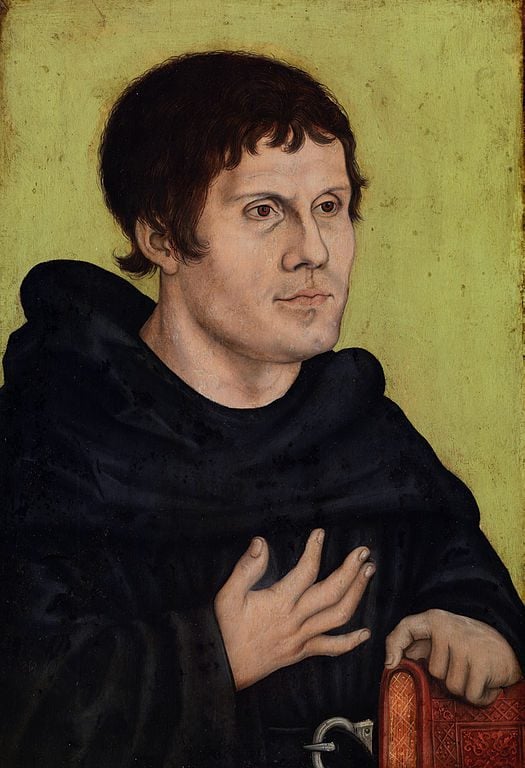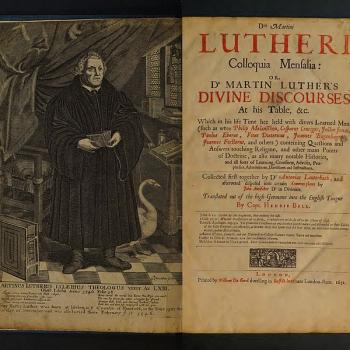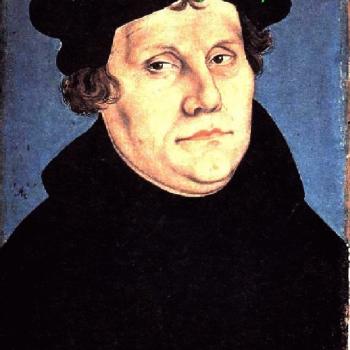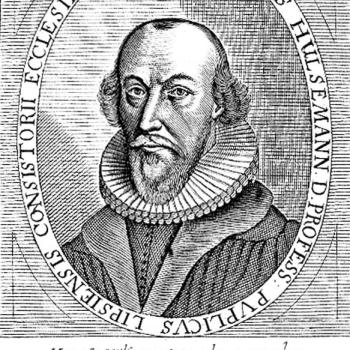
Posthumous Portrait of Martin Luther as an Augustinian Monk (after 1546), from the workshop of Lucas Cranach the Elder (1472-1553) [public domain / Wikimedia Commons]
***
[4-27-04]
***
Many Protestants have argued that Martin Luther never intended to start a “new religion” or denomination, or to split Christianity; in fact that he never intended to leave the Catholic Church. One can quibble about when and why he intended on starting a new version of Christianity, but the fact remains that he did. It is foolish to think that the Catholic Church was supposed to simply bow to Luther’s novel ideas, rather than assert its own received Tradition and demand a retraction on his part.
Luther refused to retract his revolutionary opinions, so unless one thinks that any Christian communion is obliged to bend its doctrines and beliefs to the whims of one dissenting person, then there is a sense in which Luther “intended to start his own religion” (I myself wouldn’t say it is a new religion, because it is still Christianity; I prefer the terminology of a revolt against the Catholic Church and the beginning of a new denomination or form of Christianity).
It is also said that Luther’s case against indulgences was clear-cut and unambiguous: that the Catholic Church was in the wrong, through and through. There were indeed abuses, and the Church dealt strongly with them — to that extent we might be grateful to Luther, I suppose. But he wasn’t content to deal just with abuses — as true Catholic reformers all through the centuries had done. He had to “throw the baby out with the bath water,” and so rejected indulgences altogether, along with many other received doctrines too numerous to mention.
One Protestant who wrote to me stated: “the Church’s marketing strategy was ‘as the coffer rings, the soul from purgatory springs.’ ” But this is untrue. This was neither a “marketing strategy” nor does this characterization present a totally accurate assessment of Johann Tetzel’s actual views: the famous figure who often represents in the mind of the non-Catholic all that is excessive, foolish, and evil in the Catholic Tradition. Luther lied when he said of Tetzel in a 1541 pamphlet: “He sold grace for money at the highest price.” Tetzel’s teaching was erroneous in some respects, according to Catholic dogma. But it was not identical to the silly stereotype. What have most anti-Catholics, or even non-Catholics ever read about indulgences from a Catholic perspective? If they had read much at all, they would not repeat the tired slanders against both the Church and Tetzel. But such is the way of cultural mythology and fables — passed down for generations.
Luther (not immune to slander when it suited his polemical purposes) wrote of Tetzel:
He wrote that an Indulgence is a reconciliation between God and man and takes effect even though a man performs no penance, and manifests neither contrition nor sorrow.
In point of fact, Tetzel’s teaching, which we have in written form in his Vorlegung, states precisely the opposite:
The Indulgence remits only the pain [i.e., the penalty] of sins which have been repented of and confessed . . . No one merits an Indulgence unless he is in a truly contrite state.
He did indeed exaggerate the monetary aspect of the indulgence, but not according to Church teaching. Even the silly saying about the “coffer” cannot be traced to Tetzel with any certainty. He did teach a version of what the saying conveys, but it was — again — not the official teaching of the Church, as is often ignorantly and slanderously implied. The view was not supported by the Papal Bulls of Indulgence, and the pope had not taught this, as Luther falsely charged.
(Background Source: Luther, Hartmann Grisar, S.J., translated by E.M. Lamond, edited by Luigi Cappadelta, London: 1914-1915, 6 volumes; taken from vol. 1: 342-344)
As for the relative “case” and justifiability of the actions of Martin Luther and that of the Catholic Church, particularly between 31 October, 1517 (95 Theses) and 3 January 1521 (Luther’s excommunication), one might do well to ponder the following facts:
By that time he had written at least three scathing denunciations of the Catholic Church (all in 1520). I shall comment on two of them:
The first is To the Christian Nobility of the German Nation. In this work, he invited the German princes to take the reform of the Church into their own hands. He wrote:
When necessity demands it, and the pope is an offense to Christendom, the first man who is able should, as a true member of the whole body, do what he can to bring about a truly free council. No one can do this as well as the temporal authorities . . .
(in Three Treatises, Philadelphia: Fortress Press, revised edition, 1970, 23)
This is a complete rejection of traditional Catholic authority, and a direct attempt to set up a State Church, which in fact occurred after Lutheranism became established. It is quite questionable, to put it mildly, that secular princes can do a better job at Christianity than bishops and popes. In fact, Luther and his right-hand man Philip Melanchthon admitted many years later that the jurisdiction of bishops was superior to the jurisdiction of politically- and economically-motivated princes.
So the Catholic Church is supposed to merrily accept this, as if it is not fatal to its ongoing structure? Just bow to all of Luther’s demands? Of course this is absurd. No institution can operate in such a ludicrous fashion. That would change the Church into a dictatorship — much as many Protestant denominations and split-off cults in fact become. Popes never even dreamt of the power and self-granted infallibility that Luther claimed in his own created church.
In The Babylonian Captivity of the Church, Luther called for the even more revolutionary notion of abolition of five of the seven Catholic sacraments, and the Sacrifice of the Mass. So, again, the Catholic Church was supposed to just go along with Luther’s radical program of “reform,” rather than excommunicate a son who was clearly obstinate and no longer a faithful Catholic? I would contend that the honest thing for Luther to have done would have been to leave the Catholic Church, since he no longer accepted its doctrines — rather than create a spectacle and a schism that had repercussions we still live with today. Surely he must have known that the revolutionary rhetoric of his treatises of 1520 would have the effect they did. If not, then he had to be one of the most naive persons who ever lived.
Yet commonly Protestants tell us that Luther only wished to reform, not revolutionize the Church. This makes no sense, once all the historical facts are taken into account. To ditch dozens of beliefs and practices of any institution, and revise it almost entirely is not reform, but rather transformation, evolution, or revolution. I have outlined above what Luther was calling for in 1520 — before he was excommunicated. The Church had previously operated on the principle of preserving its Tradition, received in an unbroken line from the apostles. Neither the pope, Luther, nor any other self-anointed “reformer” is at liberty to change apostolic doctrine at their whim and fancy. Luther even approached biblical books cavalierly, thinking that they were legitimate or not based on his personal opinion alone, as I demonstrated — from his own words — in my paper on that topic (Luther’s Radical Views on the Biblical Canon).
How in the world anyone can maintain that Luther was not a heretic (in those areas where he diverged from Catholicism), by the criteria of Catholic dogma, is beyond me. Obviously, he is not by Lutheran criteria, but if one wishes to blame the Catholic Church for excommunicating him, then they must explain how his views were not heretical by Catholic standards. This simply cannot be done; it is impossible.
As for not wanting to start his own church, I think this desire is implicit in his radical rejection of the Catholic Church. After Luther asserted in 1520 that the temporal princes ought to overthrow the rule of bishops and popes, is it reasonable to maintain that Luther thought he would play no central role in such a “counter-church”? That makes less than no sense to me.
The standard Protestant party line (which I myself used to enthusiastically embrace) is that Luther’s stance in support of Faith Alone and in opposition to indulgences was heroic and altogether necessary. But I say his position on these points was folly, because the former was based on a gross misunderstanding of Catholic soteriology (that it was somehow Pelagian and rejected not only Faith Alone, but also Grace Alone), and a novel exegesis of Scripture, which many Protestant scholars and exegetes have rejected. His polemic against indulgences was also based (arguably in large part) on misunderstanding, caricature, and slander, as I have partially demonstrated above.
Another constant theme we hear from Protestants about Luther is that he was “not perfect.” Of course he wasn’t (who is?). My point, however, about him has been that founders of Christian churches ought to be subjected to a higher standard than the rest of us (to vastly understate it), as the Bible teaches about Christian elders, etc. The fact that Luther had many glaring and serious faults (all freely acknowledged and discussed by Protestant historians) does not bode well for the truth of his claims against the Catholic Church, in my humble opinion. True reformers are pretty holy people. A St. Bernard, a St. Francis, a St. Catherine of Siena, or a St. Ignatius Loyola immediately come to mind.
It is said that Pope Leo X was just as imperfect. This may be granted by a Catholic. But he didn’t deign to create a new sect of Christianity. His imperfections had few lasting repercussions. One might argue (I think falsely) that his intransigence caused Luther to be cast out, and that therefore he started the schism (or was more to blame for it than Luther was), but I think the facts of the matter show quite otherwise. Luther had already become a heretic (by the received criteria of what constituted heresy and departure from Catholic, apostolic Tradition) before he was excommunicated.
Every Christian group has a perfect right to determine who is faithful to its theology and doctrine and who is not. Therefore, the action of the Catholic Church in excommunicating Luther is not one whit any essentially different from the Dutch Reformed Calvinists determining that the Arminians were no longer “orthodox” by their standards and separating from them, in the Synod of Dort (1618-1619).
Among the decrees made was a sentencing of the prominent Dutch jurist and theologian, Hugo Grotius (1583-1645) to life imprisonment (he escaped and settled in Paris in 1621. Louis XIII provided him with a pension, but he didn’t convert to Catholicism). 200 Arminian clergy were deprived of their ordination privileges, and one J. van Oldenbarnevelt was “beheaded on a false charge of high treason.”
(See: The Oxford Dictionary of the Christian Church, 2nd ed., edited by F. L. Cross and E. A. Livingstone, Oxford University Press, 1983, 421, 604)
How is this different in principle from Luther’s excommunication (except that Luther was allowed to keep his head)? If the Catholic Church is deemed more (or solely) guilty of the Protestant-Catholic schism because of its supposed “intransigence and inflexibility and dogmatism,” then why are the Dutch Calvinists not equally accused with regard to the Calvinist-Arminian schism?
Didn’t they know that the Arminians possessed many truths that they were duty-bound to accept, in order to reform themselves and avoid a tragic schism? Don’t they know it was all their fault, because of their 100-year process of corruption and dogmatic, self-righteous tyranny over the consciences of their subjects, and hardly at all the fault of the sincere, Bible-loving, freedom-loving Arminian “reformers” who dissented on things like God’s predestination of sinners to hell apart from their free will and consent to reject God?
*****
Meta Description: Puncturing of the myth that Luther only desired to “reform” the Catholic Church & go back to what was, rather than bring in many aspects that never existed.
Meta Keywords: Luther, Martin Luther, founder of Protestantism, origin of Protestantism, Protestant Reformation, Reformation, Protestant reformers, Reformers, Lutheranism, religious wars, 16th century Germany, Protestant revolt, Protestant Revolution, 95 Theses, Here I stand, Diet of Worms, Philip Melanchthon, Counter-Reformation, Catholic Reformation, Bondage of the Will, Peasants’ Revolt

















